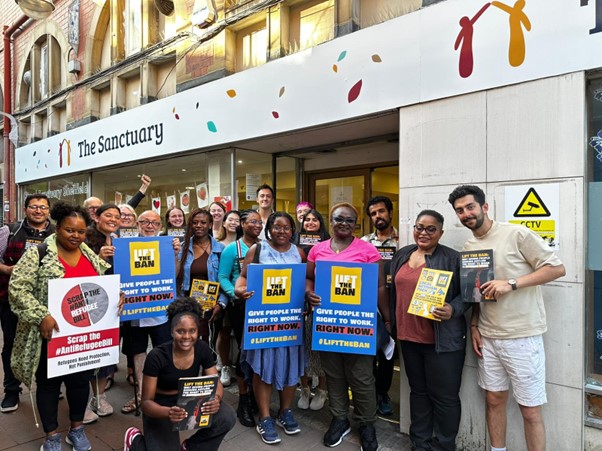Refugees who come to England believe the current asylum system is failing and the arduous policies set make people vulnerable to human trafficking and exploitation.
The Home Office have implemented a strict 28 day eviction policy for newly recognised refugees, increasing this from seven days, but this still leaves displaced people struggling to navigate the maze of paperwork and bureaucracy.
In this period a refugee needs to find somewhere to live, open a bank account, and apply for universal credit. Many do not speak English and are prevented from working until they receive their refugee status.
Blessan Babu is a delivery and advocacy manager from SPRING, a collaboration of six organisations, including City of Sanctuary and Sheffield City Council, who help refugees settle into Sheffield. He says: “It is an impossible task you are expecting refugees to do. They’re isolated from their families with no support network and once they’ve fallen through the cracks, they’re gone. That’s when exploitation happens.”
Asif (not his real name) secured his refugee status in October 2023, but shortly afterwards found himself homeless, due to the previous seven day time period being too short to set up a UK bank account and find new accommodation.
He came to the UK at the beginning of the pandemic, after fleeing civil war. Although Asif was born in the UK, this does not automatically give a person British citizenship. This can only be granted if a person is born to a parent who is either a British citizen or who has a settled status.
Asif, who can speak English, was sent to Sheffield after claiming asylum and began volunteering at the City of Sanctuary, where he made new friends and was able to work because of his medical background as an A&E doctor.
Even though Asif was employed while he waited for his Home Office decision, he still found himself homeless due to the strict eviction policy. It took almost two years for him to receive the legal status.
“When you have a decision, you don’t have time to process it,” Asif says. “You don’t feel safe at all, you’re on very shaky ground. You need time and breathing room to analyse it and process it. They’re setting us up to lose, they take away your autonomy.”
Asif, who still lives in Sheffield and works for the NHS, explained the community he built at the City of Sanctuary helped him throughout the complex process. “The Home Office don’t care, they just want to send you over to the next form. In their eyes, you’re a monster, you’re not an individual and they have to check a box. It’s a vicious cycle, they’re setting you up for failure. They are abusing someone who doesn’t know how the system works. It’s a poverty trap, even if you speak the language.”
Even after Asif found a property to rent, he needed two guarantors to vouch for him before he signed the contract, something he was only able to do because he met people through volunteering.
Asif believes 28 days is still not enough time for refugees to open a bank account, sign up for universal credit, and find a new home, especially if they cannot speak English.
Hamsa (not her real name) faced short term eviction after her refugee status was approved on 21 March 2022. She says: “I had been struggling for seven years before I had this decision.”
She was living in temporary accommodation provided by The Salvation Army but after receiving her legal status, Hamsa’s building manager told her she needed to leave immediately and apply for council housing. The Citizens Advice Bureau told her she should have 28 days and to not move out, but Hamsa said she was scared she was breaking the law so left.
“I got letters after letters. I had to miss work to go and ask the council for help,” she says. “One day I sat there for five hours waiting to speak to someone. You can’t get on with your life or do anything.”
While she can speak English, Hamsa finds it challenging to write and read in the language, so had to wait a week, after her eviction, to be given a support worker who helped her apply for housing and universal credit.
Afterwards she was bounced around different temporary accommodation in various hotels across Sheffield for weeks, each only booked for three days at a time. At one hotel, the manager stopped Hamsa in the lift and told her she could not go up to her room because there was a festival in Sheffield and the hotel had been fully booked. “It was raining outside, all my things were on the side of the road and taxi drivers were turning me down because of all of my stuff,” she says.
Hamsa was relieved and delighted when she had a call from the council about an available property, but to her dismay, when she viewed it there were binbags everywhere and dirty nappies on the floor. She asked the council if they would clean it before she moved in, but was told she needed to do this herself. Understandably, Hamsa declined their offer because of the grim condition of the house. She has since moved into another council home.
Hamsa was given confirmation she was permitted to work after she received her refugee status, but her solicitor, who was helping her with the official paperwork, left her job, leaving Hamsa in limbo. She explained her case fell through the cracks and nobody got in touch with her about what was happening. It was also never explained to Hamsa that her salary would have tax deductions and on her first payslip she had been overpaid, a debt which she is still paying back now. “They should explain everything including benefits and taxes,” she says.
Despite their harrowing experiences, both Hamsa and Asif said they were grateful they spoke English and were in Sheffield, as some refugees are taken to isolated villages, making it even harder for them to access essential services and help.
SPRING want to create a sustainable and long term solution to the lack of housing in the city. Mr Babu says: “We don’t believe in the blame game, we believe in partnership working by understanding the pressure the city council is facing and we want to be part of the solution.”
He wants to see the 28 day eviction policy lengthened to 56 days. This is the same amount of time The Homelessness Reduction Act 2017 automatically gives local authorities to end relief duty to homeless applicants.
“The current policy breeds modern day slavery, human trafficking and exploitation and drug dealing because there are people who will offer a warm place to stay in exchange for illegal work. They could be part of the solution to the pressure. It’s a missed opportunity, it’s a cycle of chaos.”




